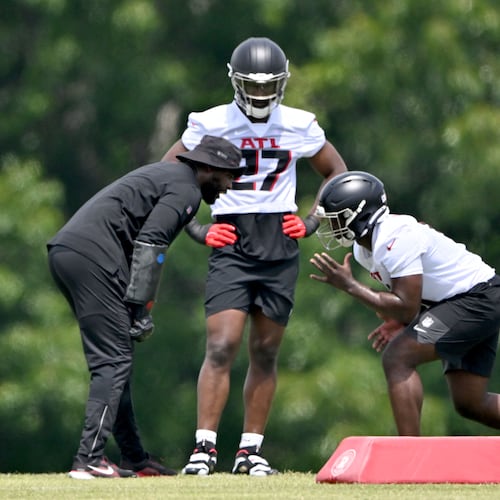The Falcons’ defense of choice is a Cover-3 Zone, which is, when played correctly, designed to keep the ball in front of the defenders.
Then the players are to rally to the ball and tackle with power and enthusiasm.
As the game wears on, the opponent gets worn down from the hits and may start to turn the ball over.
This is what happened in Super Bowl XLVII, when Seattle’s defense, coordinated by Dan Quinn, pummeled Peyton Manning and the Denver Broncos in a 43-8 massacre.
It was an outing such as that which led the Falcons to hire Quinn as head coach Feb. 2, 2015.
But fast forward to 2019, and the Falcons’ defense, which is now coordinated by Quinn, is having trouble getting off the field. The unit is giving up points and yards by the bushel, and the ball is going over their heads for too many long gains.
Quinn and his staff have undertaken a project to find out how the breakdowns started and are trying to fix them before the Falcons (1-5) play the Rams (3-3) at 1 p.m. Sunday at Mercedes-Benz Stadium.
“We started last week looking at all of the stats part of it, something you don’t want to do,” Quinn said. “We went back through all of the games and said which issues are we having that we can get coached and get corrected to go.”
Quinn said he started to see some improvement in the Arizona game.
“Although there were two or three explosive plays that were in the zones, there were actually a number of techniques that were actually played quite a bit better,” Quinn said. “We are going to push on that again (Wednesday).”
The Falcons’ problems on defense were unexpected.
“The number of explosives, the number of big plays, that’s a major surprise,” said Fox analyst Charles Davis, who’ll work the Falcons’ game Sunday. “You just don’t expect that, especially with the style of defense that they have installed. That doesn’t usually lend itself to those kind of plays happening.”
The Falcons are allowing 271.2 yards passing per game, which ranks 27th of 32 teams in the NFL.
“When you think about Seattle, a lot of stuff stayed in front and you had a free safety that cleaned up things back there,” Davis said. “You are just not seeing that. It’s a surprise. I don’t know how to put it.
“I’m absolutely surprised by the whole thing. You couple it with a lack of a pass rush as well, that’s a tough task for everyone.”
Passing-game coordinator Jerome Henderson is working on the issues, too.
“We are trying to cut out mistakes,” Henderson said. “We’ve made a few mistakes that have given up big plays. We are trying to fix that. We are trying to fix our awareness in zones, our drops. We are working on every facet of zone coverage right now.”
The Rams have three talented receivers in Cooper Kupp, Robert Woods and Brandin Cooks. The Rams average 272.5 yards passing per game, which ranks sixth in the NFL.
“We have a lot of work to do right now from where we are to move forward to where we want to be,” Henderson said. “We have this week to start on the road to getting it fixed like we want it to be.”
Some have called for the Falcons to play more man-to-man coverage to simplify things for the players.
“You always have those (man-to-man coverage) thoughts,” Henderson said. “When you look at it, we’ve struggled there, too. We just have got struggles in coverage right now and we’ve got to get them fixed.”
The coverage is not getting much help from the defensive front. The Falcons have five sacks, which is tied for last in the league. Defensive tackle Grady Jarrett leads the team with two.
“My major shock is defensively, the struggles that they are having,” Davis said. “The head coach went all-in to be the DC. He’s a pass-rush specialist, and they are not getting much in that (area). I think there was the thought that a lot of guys would come back to the numbers that we’d seen before i.e. Vic Beasley. We haven’t seen that so far yet.”
Henderson believes that better coverage could lead to more sacks.
“The pass rush and coverage goes hand-in-hand,” Henderson said. “If we can’t buy them time, they can’t get there. Sometimes, they can help our coverage with their rush. It works hand-in-hand, and we need to have a partner relationship where the coverage is working and the rush is working well.
“Again, we are trying this week to get that fixed.”
---
Subscribe to "The Bow Tie Chronicles" podcast with the AJC's D. Orlando Ledbetter on iTunes or on the new AJC sports podcasts page.
About the Author
Keep Reading
The Latest
Featured


